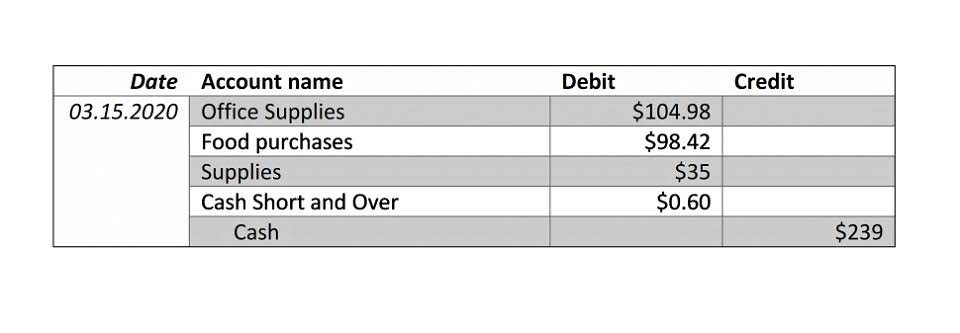Content

Today, bookkeeping and accounting occupy a prominent role in the business world. Third parties may or may not require your cash flow statement, but it’s essential for informing management decisions. Running out of capital is one of the most significant dangers for startups, and a cash flow statement helps you see that coming.
- It’s the easiest to follow, and your bookkeeping software should be able to handle it.
- The Ascent is a Motley Fool service that rates and reviews essential products for your everyday money matters.
- Double-entry tracks where your money comes from, and where it is going.
- The chart of accounts may change over time as the business grows and changes.
- This book does a good job of taking the untrained and giving them a foundation in bookkeeping basic.
- Enters every transaction twice, as both a debit and a credit, to “balance the books” between accounts.
You also have to decide, as a new business owner, if you are going to use single-entry or double-entry bookkeeping. Single-entry bookkeeping is much like keeping your check register. You record transactions as you pay bills and make deposits into your company account. It only works if your company is relatively small with a low volume of transactions. However, managing your own bookkeeping means you’re in charge of keeping your finances in order, storing records and creating necessary statements.
How to find bookkeeping help for small businesses
This can range from loans you’ve taken out to any unpaid bills you might have yet to pay. In the meantime, start building your store with a free 14-day trial of Shopify. After all, if there are ways to evaluate new initiatives and expenses before the end of the month, you can make faster but still-informed decisions.

This is a great book for a beginning bookkeeper at a small nonprofit. The specific instructions are well written and easy to follow.
Bookkeeping 101: How to Keep Records for Your Small Business
This article will help you sail through the bookkeeping basics. The best part is that you will not require any prior knowledge or an accounting degree to get started.
Look at your books and start canceling those subscriptions. Think of bookkeeping as an accountability buddy — it tracks your daily income and expenses and holds you accountable at managing your money.
Bookkeeping Mistakes to Avoid
Visit SBA.gov to find out more about how small businesses can stay legally compliant. Every time you perform a financial transaction—for instance, make a sale, accept a client’s invoice, or pay a bill—you should record that transaction in your general ledger.
- More than likely, someone within your small-business community will be able to point you in the right direction for getting the best bookkeeping assistance for your business.
- Regularly organizing and updating your books can help you catch that erroneous overdraft fee today, rather than six months from now, when it’s too late to bring up.
- It gives you an in-depth look at your expenses and revenue.
- Analyzing them can reveal your startup’s strengths, weaknesses, and growth opportunities.
- Bookkeeping is essential to the vitality and long-term success of any small business.
It makes sense to consider appointing an accountant the moment the toiling over your paperwork costs your business. By putting an expert in charge, you’re freeing yourself up to run your business how you imagined it would be without all the complicated https://www.bookstime.com/ number-crunching getting in the way. Add transactions into your books regularly (e.g., once per week). The more frequently you keep up with accounting, the less of a chore it will be. Try setting reminders to avoid missing deadlines of tax returns.
What Are The Types Of Bookkeeping Systems?
Revenue is all of the money you collect in the process of selling your services and goods. There are even some companies that collect revenue in other ways, such as selling assets their business doesn’t need. Equity is all of the money you invest in the company as the owner plus all the accumulated profits. As a small business owner, your equity is shown in a capital account. This is another simple one, as it’s simply all of the money you spend on products or services which you plan to sell to customers. On the flip side, accounts receivable is the account that keeps track of all the money that third parties owe to you. Again, it can be customers, banks, companies or anyone that purchased or borrowed from your business.

Sandwich Math partnered with Ceterus late last year to bring a full accounting and benchmarked reporting solution to Jimmy John’s franchisees. With records in good shape and neatly organised, you know exactly what is stored where so you save a lot of valuable time. If you’re Bookkeeping 101 too busy and approaching tax deadlines, you’ll be thankful that you took the time to keep your records nice and tidy so that you save time by knowing exactly where to look. If you have a small business and you have employees, then payroll is the way you pay your employees.
Maintain Daily Records
He’ll cover the top tips for setting your books up for success, common bookkeeping pitfalls to avoid, and the costs and benefits of outsourcing your bookkeeping. However, the classes had pretty much nothing to do with non-profits. Reading this book refreshed some of my accounting skills. As a professional bookkeeper and aspiring accountant, this book covered a part of bookkeeping that I was largely unfamiliar with (bookkeeping for a non-profit). This book does a good job of taking the untrained and giving them a foundation in bookkeeping basic.

0 Comments